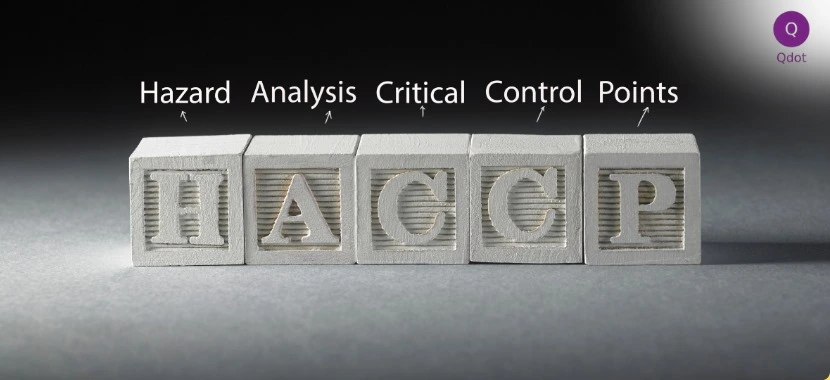The Saudi Arabian food industry is changing and developing fast. Large-scale production and distribution of food products in the Kingdom is replacing traditional restaurants and catering services, as business enterprises aim to meet the needs of their consumers with products of the best quality and safety.
HACCP is not a certificate, but a system of internationally acclaimed food safety. It indicates all the possible risks in food handling, processing, and storage, followed by the development of preventive controls to manage and monitor them. To Saudi businesses, HACCP certification signifies not just compliance but also credibility, professionalism, and trustworthiness.
This blog addresses the issue of how HACCP will provide your food business with a competitive advantage in Saudi Arabia by enhancing consumer confidence, compliance, competitiveness, and opening global trade opportunities.

Why HACCP Matters in Saudi Arabia’s Food Industry:
Saudi Arabia is a rapidly developing country, and its population requires an extremely wide range of dishes and products of high-quality food. Another project that is improving the hospitality, tourism, and retail-related industries, which are directly related to food, is Saudi Vision 2030. Meanwhile, the Saudi Food and Drug Authority (SFDA) is imposing stringent standards to conform to the international food safety standards.
Marketing cannot keep a business alive within this kind of environment. Reputation and long-term success greatly depend on trust and compliance. HACCP offers a formal system through which a business can show its commitment to food safety and consumer protection.
Building Consumer Confidence:
One of the highest priorities of Saudi consumers is food safety, particularly for families and health-conscious people. One contamination or foodborne disease outbreak will destroy the image of a brand forever.
HACCP has the advantage that it allows businesses to be proactive in preventing risks instead of responding to them once they arise. This gives the customers confidence to buy at certified facilities. Such assurance results in repeat business and good word of mouth in community-oriented markets such as Saudi Arabia.
Compliance with SFDA Regulations:
The SFDA periodically inspects food establishments, and noncompliance may lead to fines and even shutdown. The HACCP certification is harmonized with the requirements to provide a lower threat of violations.
HACCP, being a globally recognized system, also simplifies licensing and approvals and minimizes inspections. Inherently, certification would protect your business not only against financial and legal risks but also against glitches.
Competitive Edge in a Crowded Market:
Saudi Arabia has thousands of restaurants, catering companies, and factories, so competition is stiff. HACCP certification provides your business with an obvious sign of professionalism that distinguishes it from other businesses that are not certified.
- Cafes and Restaurants will be able to attract more families as well as corporate clients.
- Catering Companies are better placed to receive contracts with hotels, airlines, and government institutions.
- Food Manufacturers give their distributors and retailers the impression that they are a good supplier.
In either event, certification is a plus, and your brand is more attractive to consumers and business partners.
Gateway to International Trade:
Saudi Arabia is a major participant in the world food trade. Most importing nations, especially in Europe, Asia, and the US, insist on HACCP or similar certification of food products before they will accept them.
To the Saudi exporters, HACCP is their passport to other markets. It gives foreign consumers confidence that goods are of high safety standards. This not only opens up export opportunities but also puts your brand on the world map as a world-class producer, in your own country as well.
Operational Efficiency and Cost Savings:
HACCP increases business efficiency as well. Certification will result in:
- Less Waste by detecting risks early.
- The same processes that reduce errors.
- Greater Employee Sensitivity to hygiene and safety.
- Reduced Costs through a decrease in the number of recalls and spoilage.
Finally, HACCP helps to increase profitability by eliminating issues at the initial stage.
Attracting Partnerships and Investors:
Due to the development of the food industry in Saudi Arabia, numerous enterprises are interested in investment or cooperation. HACCP certification builds credibility among investors who like firms with good risk management and operating controls. It indicates long-term stability, and your business is more welcome to be financed and expanded.
Future Proofing Your Company:
The Saudi food industry is evolving rapidly owing to new trends, stricter regulations and laws, and heightened consumer expectations. The HACCP certification assists companies in adopting the culture of continuous improvement as a change-over adaptation method.
Saudi Arabia will open up to more tourists, investors, and international brands under Vision 2030. Businesses that become certified will clearly have an advantage over not becoming obsolete, whereas uncertified ones will face a risk of being rendered irrelevant.
Conclusion:
HACCP certification is not merely a prerequisite in the Saudi fast-paced food and beverage sector; it is a strategic benefit as well. It creates consumer confidence, complies with SFDA, improves competitiveness, promotes global trade and enhances efficiency in operations.
HACCP is a source of competitive advantage, reputation, and long-term success to Saudi food enterprises that want to take over the market. Having safety and excellence as your core values, not only will your business thrive locally, but it will also be ready to go global.
